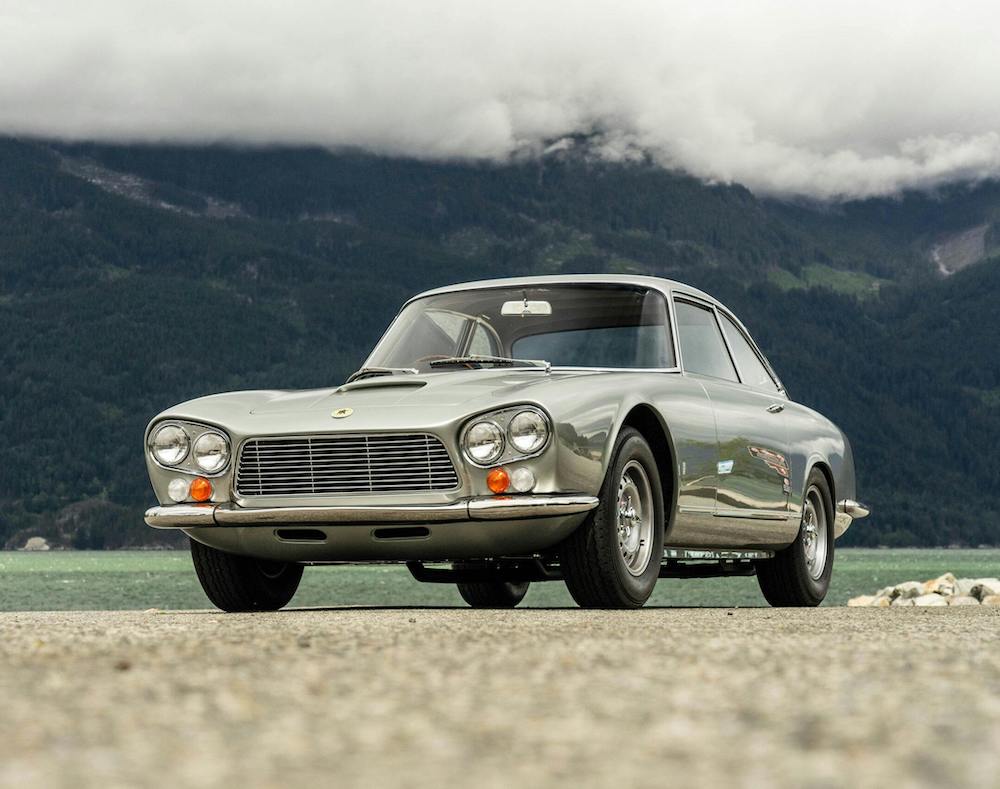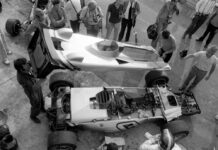Rolls-Royce’s Spirit of Ecstasy perches atop the hood of its genteel coupes and saloons with grace and poise. The curved horns of a vintage Dodge Ram mascot say “Look out! Pickup truck coming through!” But what does a tortoise emblem say about a car? Especially one from a brand that sounds as corporate-accountant stodgy as “Gordon-Keeble?”

If you’ve read your Aesop’s Fables, though, you’d know that it takes a tortoise to beat a hare, and it’s the heart beneath the forward-folding hood of this gorgeous grand tourer that enables this car to live up to the tale. It’s not the expected straight-six you might find in another British marque like Jaguar or Aston Martin, but instead a bruising 327 cubic inch Corvette V-8.
And then there’s the styling, restrained and gorgeous enough to make the owner of a Ferrari 250 GT Lusso turn their head to look. It looks like an Italian design because it is—penned by a young man who would go on to shape the De Tomaso Mangusta and Maserati Ghibli.

Rarer than an Aston Martin DB4, more vigorous than an E-Type, this is a Gordon-Keeble GT. The story is that it wears a tortoise mascot because someone’s pet wandered into a photo shoot of the prototype model, and someone placed it on the nose of the car as a joke. Whatever the reason, there’s far more to the story of the Gordon-Keeble than an unusual badge.

Building cars profitably and reliably is difficult, but that never stopped the optimistic. Particularly in the postwar U.K. car market, where legions of people headed to their garden sheds with a gleam in their eyes and hope in their hearts. For the most part, it has not worked out.
But it did for John Gordon, albeit briefly. In 1959, Gordon was managing director at the Peerless car company, which was producing a small sporting GT, largely with Triumph TR3 mechanicals. Peerless was not doing well financially at the time, and Gordon’s interest was piqued when an ambitious project showed up at the factory.
Jim Keeble was a racing engineer in Ipswitch and a former RAF Spitfire pilot with a keen interest in motorsport. He’d already built a few racing specials and had been approached by an American F-101 Voodoo fighter pilot who was looking to swap a Corvette V-8 into his Peerless. Given that the Peerless GT weighed about 2400 lbs, such a Frankenstein’s monster would have been quite a handful.

But it got the pair thinking, and they hatched a plan to build a car around the idea of marrying a hand-built space frame with reliable American V-8 power. Keeble got to work on the underpinnings that winter. Meanwhile, Gordon approached Bertone at the Turin auto show. Nuccio Bertone had just the man for the job, recently hired from Fiat’s Special Vehicle Design department: Giorgetto Giugiaro.
Giugiaro, then just twenty-one years old, sketched out a classically elegant GT shape, free from over-adornment. The canted headlights were a bit of a flourish, but not overdone. For the interior, an aircraft-inspired theme was chosen, as befitted a car built by a Spitfire pilot for a jet fighter jock. This first prototype was built with a steel body and a 4.6-liter V-8.


The prototype was shown at the 1960 Geneva auto show, to solid approval. Gordon and Keeble were confident enough in their creation that they allowed U.K.-based publication Autocar to give it a go. The magazine was duly impressed, calling it “the most electrifying vehicle we have ever tested.”
With this vote of confidence in pocket, the prototype was sent across the Atlantic to demonstrate to the General Motors brass that the concept merited a supply of engines. Zora Arkus-Duntov, the Belgian-born racer who was so instrumental in creating the Corvette, reportedly asserted that the prototype was quicker than his pride-and-joy ‘Vette.
Arkus-Duntov and Gordon are said to have been old friends, possibly due to overlapping interests in the 24 Hours of Le Mans. Whatever the case, the more important result of the prototype’s pan-Atlantic debut was winning the approval of GM Executive VP Ed Cole, who opened the door to supplying the then-new 327 small-block V-8. Supposedly, there was even some enthusiasm expressed for making a production Gordon-Keeble available through GM dealerships.

Unfortunately, the Cinderella story started to come unwound almost immediately. John Gordon left the company, there were issues with supply chain shortages, and cash flow problems saw Gordon-Keeble go under in 1965. It was resurrected with fresh investment, but by 1967 was again bankrupt. The final car was assembled in 1971, built from spare parts.
The total run is said to be 100 cars, although very possibly closer to 90 actually made it out the door. The survival rate, however, is quite high, thanks to the very active Gordon-Keeble owners club in the U.K. Founded at roughly the same time that the last Gordon-Keeble was being built, this group of owners has not only preserved the breed but identified some slight improvements for it.
The example you see here is chassis number 61, owned by Paul Holland, who himself purchased it from noted Triumph collector Len Drake in southern British Columbia. Patience was required—it took four years from first spotting it until Drake was convinced to let it go. Finished in red when it was purchased, it was sent to the team at RX Autoworks for restoration in 2018, where it took a further four full years to bring to its current glory.


The car was in a sad way when the bodyshell came off, with rust aplenty and an engine that wasn’t running on all cylinders. Beyond the obvious mechanical refurbishment, a lot of time was spent getting the details right—making sure the chrome aligned, and reworking the exhaust when the first iteration proved out-of-character raucous. Today, this may well be the nicest Gordon-Keeble on the planet.


Upon startup, the 327 V-8 clears its throat then settles into a classic small-block Chevy rumble. Slot the notchy gearbox into first, and the Gordon-Keeble pulls away gently. It’s happy to loaf along at highway speeds in top gear, always with the sense that there’s ample power in reserve underfoot. The ride is very good, the grip excellent, the steering slow-but-precise so as to not feel nervous at speed. It’s exactly the kind of grand tourer you’d expect to have appealed to a fighter pilot in its day.
With a four-speed T-10 manual gearbox and 300 hp and 360 lb-ft of torque on tap, the Gordon-Keeble is capable of running up to highway speeds in around six seconds and on to a top speed of over 140 mph. Disc brakes at all four corners handle stopping duties. At the time it would have been one of the fastest things on the road, easily capable of matching a contemporary Aston Martin. Today, it’s still authoritatively muscular, with none of the truck-like characteristics you might get from a vintage Aston.


Tazio Nuvolari, the great Italian Grand Prix driver, was known to wear a golden tortoise as a good luck charm. After his death, through the mid-1950s, a tortoise was given to the drivers who were fastest through the Cremona-Mantua-Brescia stage of the Mille Miglia. Sir Stirling Moss had one, and called it his most prized honor.
Likewise, the tortoise on the badge of the Gordon-Keeble is a wry reference to the speed enshrined within. The brief story of Gordon-Keeble was neither slow nor sure—not really Aesop’s tortoise. It did, however, yield a rare car of stunning looks and formidable capability. For those lucky few who get to enjoy them, that’s quite the victory.
Report by Brendan McAleer for hagerty.com










